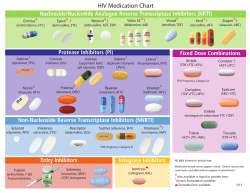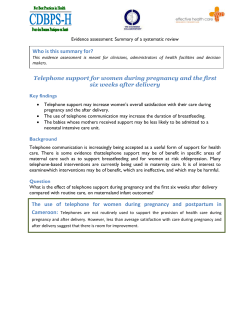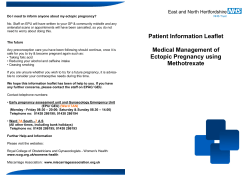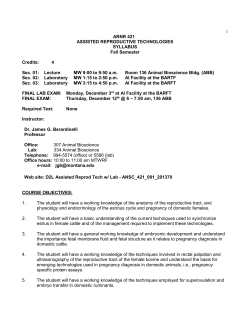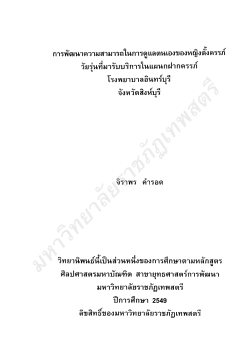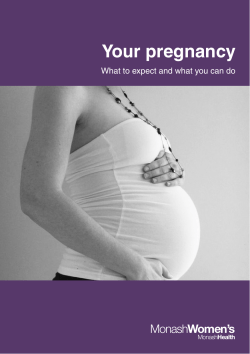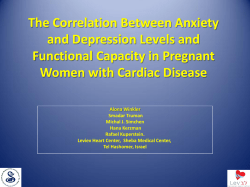
HIV and PREGNANCY Dr. Nana Philip Njotang
HIV and PREGNANCY Dr. Nana Philip Njotang Senior Lecturer, FMBS University of Yaounde I Central Maternity, Central Hospital Yaounde Postgraduate Training in Reproductive Health Research Faculty of Medicine, University of Yaoundé 2007 PLAN • Introduction. • Vital Statistics. • Effect of HIV on Pregnancy. • Effect of Pregnancy on the Mother • Antenatal visits in an HIV Patient. • Mechanism of HIV Transmission in Pregnancy. • Intrapartum management of HIV. • Postpartum management. • Special measures related to the baby. Dr. Nana Post graduate RH Objectives • Screen and treat all conditions in pregnancy that may increase risk of mother to child Transmission of HIV. Dr. Nana post-graduate RH Vital Statistics Adults /Children Living with HIV 2003 Europe occidentale Amérique du Nord 980 000 Caraïbes 570 000 Europe orientale & Asie centrale 1,2 million Afrique du Nord & Moyen-Orient 440 000 Amérique latine 1,5 million 550 000 Asie de l’Est & Pacifique 1,2 million Asie du Sud & du Sud-Est 6 millions Afrique subsaharienne 29,4 millions Australie & Nouvelle-Zélande 15 000 Total : 40 millions Dr. Nana Vital Statistics Evolution of Prevalence of HIV in Cameroon 2004 14 11 Prevalence rate (%) 12 10 PREVALENCE 7,2 8 5,5 5 6 5,5 3 4 2 11,8 2 0,5 1,04 0 1987 1988 1992 1994 1995 1996 1998 2000 2002 2004 Years Difference 1987-2002, study amongst high risk groups, 2004 National study with randomised sampling. Dr. Nana Prevalence of HIV in Cameroon according to Provinces 8,6% 9% 11.9% 11% 8% 7% 9.8% 8.4% 5,5% 6.4% 6% 6.8% 5% 4,3% 4% 999 D´la 5.5%, Y`de 10.7% 3% 2.2% 2% 1,7% 1% 0% AD CE ES EN LIT NO NW OU SU SW CAM 25-39 years age group most affected,7.8%,8.9%,8.2% respectively Dr. Nana Prevalence of HIV in Cameroon according to sex 7% 6% 5% 6,80% 4% 3% 4,10% 2% 1% 0% Women Men Ratio 1 male to 1.7 female, Urban residence 6.7% , rural residence 4% Dr. Nana Effect of HIV on Pregnancy • Classification of HIV and Pregnancy (clinical staging, WHO): Stage I a. Asymptomatic b. Generalised lymphadenopathies. clinical phase I, asymptomatic, normal activity. Stage II Weight loss <10% Skin disease (ulcerations, pruritus, nail fungi infections, mouth ulcers). Past history of zona in the last five years. Recurrent URT infections (sinusitis, common cold). clinical phase II, symptomatic, about normal activity. Dr. Nana Effect of HIV on Pregnancy - 1 Stage III Weight loss >10%. Chronic diarrhoea >one month. PUO >one month. Oral thrust (candidiasis). Lung TB. severe bacterial infections (polymyositis, pneumunia). Clinical phase III >10% activity is affected. Post graduate RH, Dr. Nana Effect of HIV on Pregnancy - 2 Stage IV HIV disease. Cerebral Toxoplasmosis, Pneumocystis carini pneumonia. Extrapulmonary cryptococcus infection. CMV infection. Oropharyngeal candida infection, septicaemia. Malignancies (lymphomas, sarcomas). Clinical phase IV >50% activity affected. Post-graduate RH Dr. Nana Effect of HIV on Pregnancy - 3 • Stage I or Clinical phase I, asymptomatic, no influence on the course of pregnancy. • Stage II or Clinical phase II, may influence pregnancy outcome. HIV infection occurs in women with high risk factors for adverse pregnancy outcome e.g. smokers, sex shoppers, single parenthood, low socio-economic status etc. • However, stage III or IV patients will certainly be more prone to adverse outcome in pregnancy. • Adverse outcomes may be LBW, prematurity, PROM, IUGR, foetal malformations, SBs, sudden infant death. Nana Effect of Pregnancy on the Mother • Theoretically, pregnancy might be expected to increase rate of progression from asymptomatic state to disease. Immunological changes in pregnancy may encourage viral replication. Pregnant women are particularly susceptible to a number of other viral infections. • Whether pregnancy does in fact increase the risk of a seropositive to develop AIDS is UNCERTAIN. Published research findings are conflicting. • During counselling it seems prudent to warn that some evidence suggest that progression to disease may be exacerbated by pregnancy. Post-graduate RH Dr. Nana Antenatal Visits • Follow-up counselling. • Establish a calendar for follow-up, monthly or at least 4 prenatal consultations. • Diagnose and Treat complications of pregnancy, threatened abortions, pre-term deliveries. • Diagnose and Treat STIs. • Diagnose and Treat Opportunistic infections. Post-graduate RH Dr. Nana Antenatal Visits - 1 • Prescribe Iron and folic acid. • Prescribe antimalaria prophylaxis (TPI), in 3 doses, 16-20 weeks, 24-28 weeks, 30-34 weeks. • Prescribe multivitamins (including vitamin A). • Explain the measures to prevent mother to child transmission and give a tablet of Nevirapine at 32 weeks, prescribe ZDV (at 28 weeks). • Maintain a good psychological support. • Give an appointment. Post-graduate RH Dr. Nana Focalised Prenatal Care An approach to prenatal care that insist on the following: • Proven action oriented towards an objective. • Individualised care centred on the woman. • Insisting on the quality of prenatal visit and not the number. • Care offered by qualified and competent staff. Post-graduate RH Dr. Nana Components of a Quality Prenatal Consultation Goal to prevent materno-fœtal morbidity and mortality and consist of : • Curative Approach, early detection and treatment of problems and complications. • Preventive Approach, prevent disease and complications. • Preparation for delivery and eventual complications. • Health promotion or Health education. Post-graduate RH Dr. Nana Danger Signs of Pregnancy • Vaginal Bleeding. • Difficult Breathing. • Fever. • Severe abdominal Pain. • Severe headaches / Blurred vision. • Convulsions/Loss of consciousness. • Uterine contractions before 37 completed weeks. Post-graduate RH Dr. Nana Traditional Prenatal Care • Places emphasizes on : Routine practice and not proven actions oriented towards an objective. The number of consultations and not the individualised needs of the client. • Frequent visits increase workload and are time consuming, expensive to the woman. • Routine measure of weight and height is not necessary. • Routine examination for ankle oedema and the lie/ position before 36 weeks not necessary. Post-graduate RH Dr. Nana High Risk Approach High risk approach, not an efficient strategy, all pregnancies carry some degree of risk, risk factors are not generally the direct cause of complications. • Women considered low risk develop complications. False feeling of security. Failure to recognise danger signs. Most high risk women deliver without complications, consequently poor use of scarce resources. Post-graduate RH Dr. Nana Calendar for Prenatal Consultations • First visit : Before 16th week or at booking clinic. • Second visit : Between 24th and 28th week or at least once in the second trimester. • Third visit : At 32 weeks. • Fourth visit : At 36 weeks. • Other visits : If complications occur, patient's desire to see the health care provider. Change of protocol by the provider (Lab test, P/H, findings on examination) or adapted to the local policy. Post-graduate RH Dr. Nana Strategies for the Prevention of Mother to Child Transmission Vertical transmission, responsible for 80-85% of children with HIV. Objective of prevention, reduce MCT, direct HIV positive mothers, the children and families to treatment centres, follow-up groups and psycho-social support. Principal areas of intervention PMCT: • Counselling/screening of HIV/AIDS. • Prophylaxis/treatment with ARV drugs. • Risk free or low risk obstetrical practice. • Risk free or low risk infant feeding. • The couple must be informed (protected sex, counselling/testing, existence of PMCT programmes). Post-graduate RH Dr. Nana PMCT Strategies Prevention of primary HIV infection. • Responsible and low risk sexual behaviour (adolescents). • Easy assess to condoms. • Early diagnosis and treatment of STIs. • Accessible counselling and testing for HIV. • Appropriate counselling to seronegative mothers. Prevention of unwanted pregnancies amongst seropositives. Offer FP services. Provide antiretroviral prophylaxis and treatment. Promote risk free sexual habits e.g. use of condoms, abstinence Post-graduate RH Dr. Nana PMCT Strategies - 1 Prevention of MCT. o Counselling and testing for HIV. o Antiretroviral prophylaxis and treatment. o Promote good delivery techniques. o Counselling for risk free infant feeding. Provide treatment and psycho-social centres for persons living with, their children and family. • Offer treatment and support services. • Early diagnosis of infected children and management. • Community implication for holistic approach. Post-graduate RH Dr. Nana HIV Testing • Counselling and voluntary testing: Principal directives of counselling: Confidentiality: information obtained from patient, case files. Informed consent: explain objective of testing, advantages of test results, respect the decision of the client. Psychosocial support and post test services. Screening: Camstix, ELISA Western blot (confirmation). PCR: Permits an early diagnosis in children <6 months Post-graduate RH DrNana Antepartum/intrapartum Management • Immune status discovered during pregnancy. Clinical class I and II: Routine prenatal consultations as for seronegative women. History, past history that may complicate pregnancy. Prevention of malaria and anaemia. Diagnose and treatment any diseases. Routine testing for syphilis and other diseases that may complicate pregnancy. Clinical examination BP, heart, lungs, breast, liver, kidneys, limbs etc. Post-graduate RH Dr. Nana Antepartum/intrapartum Management - 1 In relation to HIV status: • Evidence for progression of disease, persistent cough, diarrhoea, fever, other symptoms and signs of infection. • On examination, oral candidiasis, recurrent vulvovaginitis, Zona skin lesions, repeated herpes lesions, neurologic defects, condylomas, adenopathies, signs of lung infection. • Lab test, total lymphocyte count, lymphocyte CD4 count, viral load where applicable. Post-graduate RH Dr. Nana Ante/Intrapartum Management - 2 • General measures: sleep well, no alcohol or smoking, advise protected sex, balance diet, drinking freely, prevent strenuous work. • Prescribe drugs: Fe and folic acid, IPT for malaria, use impregnated mosquito bed nets, multivitamins, ATT vaccination. Prescribe ARV drugs from the 28th week of gestation AZT, Intrapartum Nevirapine with first uterine contractions. Post-graduate RH Dr. Nana Antepartum/Intrapartum Management - 3 ARV Therapy Recommendations. Seropositive woman of reproductive age with indication for ARV drugs - AZT + 3TC + NVP or D4T + 3TC + NVP (Triomune). EFV contra-indicated in 1st trimester pregnancy. Woman on ARV drugs and becomes pregnant - continue treatment to labour and delivery (replace EFV with NVP 1st trimester). Child AZT 4mg/Kg BD, NVP 2mg/Kg stat dose. Seropositive with indication for treatment - AZT + 3TC + NVP or D4T + 3TC + NVP, 2nd line AZT + 3TC + IP (NFV) or D4T + 3TC + IP. Protocol with AZT is preferable. Post-graduate RH Dr. Nana Antepartum/Intrapartum Management - 4 Seropositive without indication for ARV drugs: mother 28 weeks of gestation AZT 600mg daily, 600mg during labour plus NVP 200mg at onset. After delivery AZT + 3TC 2 tabs daily X 7 days. Child 4mg /Kg twice daily X 7 days or one month if treatment was a <month, NVP 2mg/Kg stat dose. Seropositive and TB, lung TB class III, extrapulmonary class IV. 2nd/3rd trimester AZT + 3TC + EFV or AZT + 3TC + NVP if TB treatment hasn’t rifampicine. Replace NVP by NFV. Child AZT plus 3TC 4mg /Kg every 12 hours for 7 days. Post-graduate RH Dr. Nana Antepartum/Intrapartum Management - 5 Known seropositive without any ARV drugs before onset of labour, diagnosed intrapartum - Mother NVP stat dose + AZT and 3TC 2 tabs daily for 7 days. Child NVP stat dose and AZT 4mg/Kg twice daily for one month. Baby born to a seropositive at home, seen before 72 hours: NVP stat, plus AZT for 4 weeks. Pregnancy in a woman already exposed ARV therapy, mother 36 weeks AZT 300mg + 3TC 150mg until delivery. Child AZT + 3TC twice weekly for 4 weeks. Post-graduate RH Dr. Nana Enhanced Delivery Technique Recommended procedures: • Non stigmatisation. • Intrapartum counselling. • Intrapartum monitoring using the partogram. • Respect of infection prevention techniques. • Induction of labour, wash baby with chlorhexidine. • Caesarean section when indicated. • Proscribed: ARM, shaving, instrumental delivery, episiotomy, milking the cord, aspiration of the baby. Post-graduate RH Dr. Nana Postpartum Care • Routine control of uterine involution. • Estimate lochia loss. • Check parameters regularly. • Sitz bath if indicated. • Check for alert signs of puerperal infection. Post-graduate RH Dr. Nana Feeding of the Baby • Exclusive breast feeding (6 months). • Bottle feeding ideal if possible. • Never mixed feeding. Post-graduate RH Dr. Nana Conclusion The goal of follow-up of a pregnant seropositive woman is the reduction of MCT, while maintaining a good physical and mental health of the woman. This will generally necessitate the involvement of several people and services: family, social workers, the community, NGO´s and the Government. Post-graduate RH Dr. Nana
© Copyright 2025

